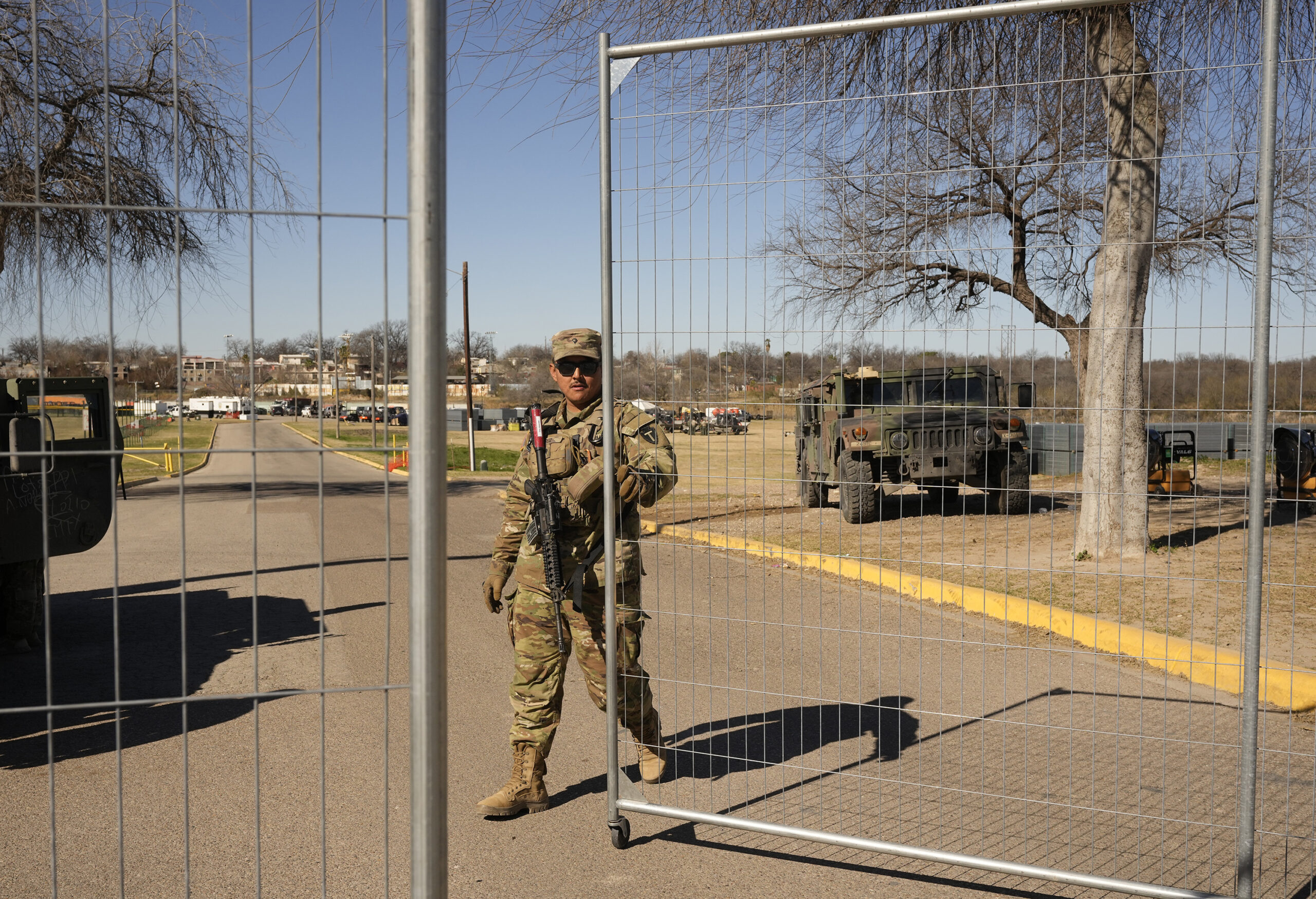

Border Patrol agents remain unable to access the border in Eagle Pass more than 100 days since Texas Gov. Greg Abbott (R-TX) ordered the state military to fence the area to prevent federal police from cutting through state-installed barbed wire.
Federal law enforcement has been locked out of a strip of the border in south-central Texas since Jan. 10, when Abbott ordered National Guard soldiers to install 6-foot fences around Shelby Park, city land situated next to the Rio Grande.
Despite threats from the Department of Homeland Security of legal action if the state did not relent and allow Border Patrol agents access to the border, the Biden administration has not escalated the court fight.
Rep. Tony Gonzales (R-TX), whose district includes Eagle Pass, told the Washington Examiner late last week that the hundreds of Border Patrol stationed in town remain unable to access and patrol the park.
“Border Patrol does not have any boots on the ground within Shelby Park where Texas Military Department has operational control for a 1.25-mile stretch,” Gonzales wrote in a text message Friday. “Border Patrol is only allowed to use the boat ramp near Shelby Park to enter the river. And that is it.”
Border Patrol agents were locked out of the park in January when the state made the unprecedented move of erecting a fence around the municipal park and forced out all federal police from inside the zone. In doing so, Texas took on the responsibility of maintaining the national border, claiming that the federal government was not adequately enforcing border laws.
DHS immediately sent Texas GOP Attorney General Ken Paxton a letter on Jan. 14 that ordered the state to allow Border Patrol access to the border.
“We demand that Texas cease and desist its efforts to block Border Patrol’s access in and around the Shelby Park area and remove all barriers to access in the Shelby Park area,” DHS general counsel Jonathan Meyer wrote in a letter sent in January to Texas officials, according to a copy of the letter the Washington Examiner obtained. “If you have not confirmed by the end of day on January 17, 2024, that Texas will cease and desist its efforts to block Border Patrol’s access in and around the Shelby Park area and remove all barriers to access to the U.S.-Mexico border, we will refer the matter to the Department of Justice for appropriate action and consider all other options available to restore Border Patrol’s access to the border.”
The Supreme Court ruled days later that Border Patrol could cut down the wire; however, the court decision didn’t affect whether Texas must take the fence down and admit Border Patrol. Without access to the river and with no judicial decree that the state must take down the fences, the standoff remains at an impasse.
Aaron Reichlin-Melnick, an immigration attorney and policy director of the American Immigration Council in Washington, said the Biden administration was carefully prodding through the situation, but the lack of legal response since its initial threat against Texas in January was noteworthy.
“Once [the Biden administration] won at the Supreme Court, they seem to have decided that it wasn’t worth the public fight, and local Border Patrol clearly didn’t want to push the issue, so they’ve contented themselves with the slow pace of litigation,” Reichlin-Melnick said in a text message.
Reichlin-Melnick added that to the Biden administration’s benefit, illegal crossings have been at lower levels since January compared to previous months under the Biden administration, the result of increased enforcement by the Mexican government. Whereas in December 2023, the Border Patrol used the city park in Eagle Pass to hold thousands of illegal immigrants after they had crossed, there was no pressing need now to use the park.
The state first sued the Biden administration in October 2023 because Border Patrol agents were cutting through concertina wire that the Texas National Guard had installed along the Rio Grande in Eagle Pass to deter and prevent illegal immigrants from entering the United States.
Texas sued on the basis that the federal government was undermining border security because most illegal immigrants who were taken into custody and arrested would be released into the U.S. to await court proceedings years down the road rather than deported. Border Patrol agents have maintained that once a person is determined to be present in the country without legal status, they must be taken into custody, not left on U.S. soil.
In a court document issued in late March, Chief U.S. District Judge for the Western District of Texas Alia Moses said the situation had pitted law enforcement forces against one another at no benefit to the public.
“For years, the federal and Texas governments have cooperated with each other to protect the border,” Moses wrote. “It pains the Court to know that the parties’ relationship in ensuring border security has diminished. Such a breakdown affects the parties’ line agents, who are not responsible for the direction of their respective organizations. More importantly, that breakdown affects the public. The parties should never forget: they are bound to serve the public.”
CLICK HERE TO READ MORE FROM THE WASHINGTON EXAMINER
Immigrants encountered by the Texas military are transported to Border Patrol agents outside the park and taken into federal custody for processing and likely released into the U.S. A small percentage of immigrants could be prosecuted by the state for criminal processing, but Abbott’s actions in Eagle Pass would largely lead to the same outcome as when Border Patrol cut the fences and took immigrants into custody then released them.
The White House, DHS, Abbott’s office, Paxton’s office, and the National Border Patrol Council did not respond to requests for comment.




